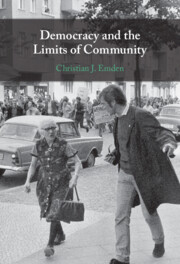Refine search
Actions for selected content:
3410549 results

The Idea of Cultural Heritage
- A Liberal Perspective
- Coming soon
-
- Expected online publication date:
- April 2026
- Print publication:
- 30 April 2026
-
- Book
- Export citation
Allen Ginsberg in Context
- Coming soon
-
- Expected online publication date:
- April 2026
- Print publication:
- 30 April 2026
-
- Book
- Export citation

Vulnerability and Relational Equality
- Coming soon
-
- Expected online publication date:
- April 2026
- Print publication:
- 31 March 2026
-
- Book
- Export citation
Rethinking Capital Punishment
- The Pre-History of the Abolition of the Death Penalty
- Coming soon
-
- Expected online publication date:
- April 2026
- Print publication:
- 30 April 2026
-
- Book
- Export citation

Mandatory Cooperation Under International Law
- Coming soon
-
- Expected online publication date:
- April 2026
- Print publication:
- 30 April 2026
-
- Book
- Export citation
Urban Revolution
- People's Communes in Beijing
- Coming soon
-
- Expected online publication date:
- April 2026
- Print publication:
- 31 March 2026
-
- Book
- Export citation

Democracy and the Limits of Community
- Coming soon
-
- Expected online publication date:
- April 2026
- Print publication:
- 31 March 2026
-
- Book
- Export citation

Bloody Powerful
- The taboo-busting guide to periods, menopause and everything in-between
- Coming soon
-
- Expected online publication date:
- April 2026
- Print publication:
- 23 April 2026
-
- Book
- Export citation

Words that Wound
- Exploring Online Offensive Language
- Coming soon
-
- Expected online publication date:
- April 2026
- Print publication:
- 30 April 2026
-
- Book
- Export citation

Coverage Denied
- How Health Insurers Drive Inequality in the United States
- Coming soon
-
- Expected online publication date:
- April 2026
- Print publication:
- 23 April 2026
-
- Book
- Export citation

Abul A‘la Maududi: Al Jihad fil Islam and Other Writings
- Coming soon
-
- Expected online publication date:
- April 2026
- Print publication:
- 30 April 2026
-
- Book
- Export citation
The Geometry of Jet Bundles
- Coming soon
-
- Expected online publication date:
- April 2026
- Print publication:
- 30 April 2026
-
- Book
- Export citation

Enslaved New World
- Slavery, Freedom, and the Making of Race in Santo Domingo
- Coming soon
-
- Expected online publication date:
- April 2026
- Print publication:
- 30 April 2026
-
- Book
- Export citation
Middlemen in Search Equilibrium
- A Survey
- Coming soon
-
- Expected online publication date:
- April 2026
- Print publication:
- 30 April 2026
-
- Element
- Export citation

Decision Analysis for Creating the Future
- Coming soon
-
- Expected online publication date:
- April 2026
- Print publication:
- 30 April 2026
-
- Book
- Export citation

Genocide Prevention
- An Evidence-Based Approach
- Coming soon
-
- Expected online publication date:
- April 2026
- Print publication:
- 30 April 2026
-
- Book
- Export citation

Weak Solutions to Gradient Flows in Metric Measure Spaces
- Coming soon
-
- Expected online publication date:
- April 2026
- Print publication:
- 30 April 2026
-
- Book
- Export citation

Resilient Humanitarianism
- The League of Red Cross Societies, 1919–1991
- Coming soon
-
- Expected online publication date:
- April 2026
- Print publication:
- 30 April 2026
-
- Book
- Export citation

State Matters
- Theorizing State Fragmentation and Consolidation from Iraq
- Coming soon
-
- Expected online publication date:
- April 2026
- Print publication:
- 30 April 2026
-
- Book
- Export citation

Games on Graphs
- From Logic and Automata to Algorithms
- Coming soon
-
- Expected online publication date:
- April 2026
- Print publication:
- 30 April 2026
-
- Book
- Export citation
